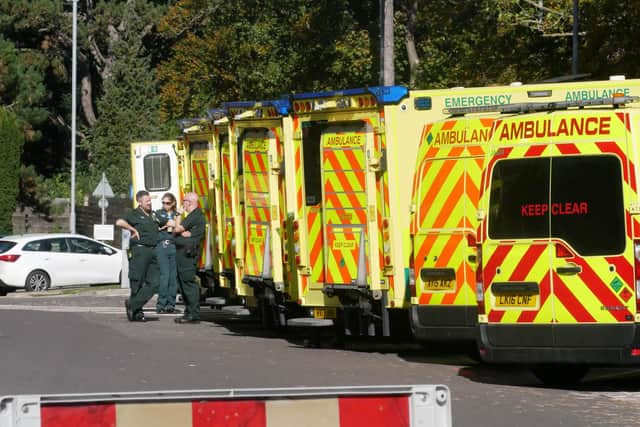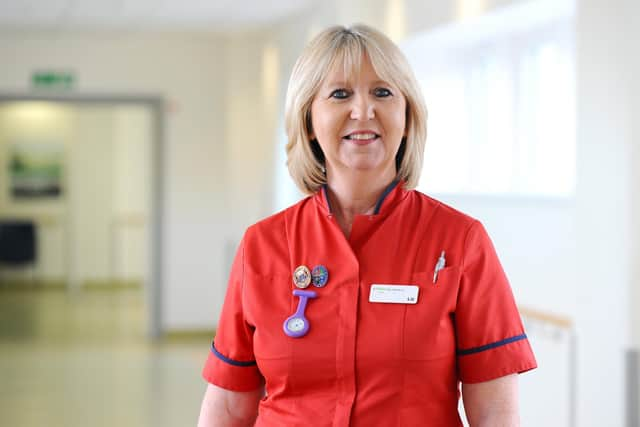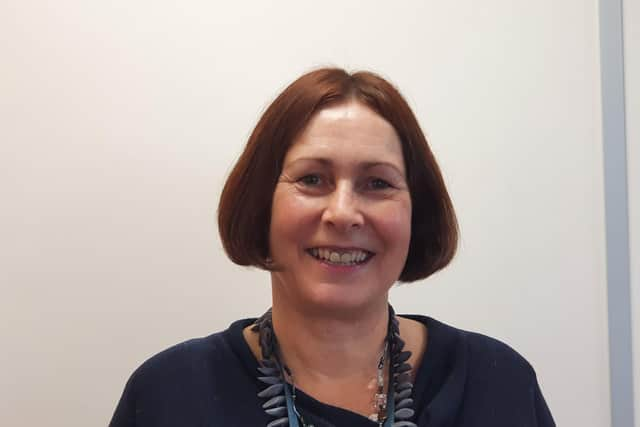Portsmouth health experts urge caution as NHS 'overstretched' by flu and Covid-19 cases
and live on Freeview channel 276
Health bosses have issued advice on how residents can help tackle the rising demand for urgent care seen across the country.
Mark Roland, deputy medical director at Portsmouth Hospitals University NHS Trust, said: ‘Our hospital remains very busy and many of the people who are attending the hospital at the moment have viral infections, particularly flu and Covid.
Advertisement
Hide AdAdvertisement
Hide Ad‘What we’re seeing in our emergency department and through to our wards is that a large number of people, particularly with pre-existing respiratory problems, are becoming very unwell with flu especially, developing significant breathlessness and wheeze and that is impacting our whole community, not just the hospital.


‘Currently, there are over 180 people in our beds either with flu or Covid or with both.
‘If you are in an at-risk group, you should have already been contacted by your GP surgery about getting vaccinated. If you haven’t been vaccinated, there’s still time.
‘Please get in touch with your GP surgery or contact your local pharmacy to get vaccinated and take protection for yourself and your loved ones from these difficult challenging viruses this winter.’
Advertisement
Hide AdAdvertisement
Hide AdThe Portsmouth University NHS Trust asked people last week to take their relatives or friends home as soon as they were declared ready to free up beds.


The trust declared a new critical incident after the hospital and the emergency department were struggling to cope.
It said the demand for urgent care in the area is ‘far outstripping’ the capacity available.
Chief nurse Liz Rix said: ‘We know that the longer a patient stays in hospital the greater the risk of deconditioning where immobility and inactivity causes muscle weakness, walking difficulty and an increased risk of falls and injury.
Advertisement
Hide AdAdvertisement
Hide Ad‘At a time when our services are really stretched, the extra support patients receive from those closest to them can really help with their recovery and return to good health and independence.


‘Just making sure your relative or friend is home safe, will not only help them recover but help us to care for another Portsmouth person who needs a hospital bed.’
Influenza-like illness consultations have increased and remain higher compared to the previous four years.
SEE ALSO: Royal Beach Hotel in Southsea to be converted into flats as planning permission is granted
Influenza admissions continue to rise with rates at their highest in those aged over 85 and in children under five years old.
Advertisement
Hide AdAdvertisement
Hide AdThe NHS trust has confirmed that the critical incident status is remaining in place for the time being, in a bid to protect an ‘over full’ emergency department. The trust has also thanked people for their continued support during ‘this challenging time’.
Portsmouth City Council’s director of public health, Helen Atkinson, has warned that high levels of influenza are adding ‘significant’ pressures across the healthcare system.
She said: ‘The best thing you can do if you haven’t already, is get the flu vaccine. This greatly reduces the risk of more serious illness.
‘We can also use a tissue to catch coughs and sneezes, wash our hands often, and keep a distance from anyone with flu-like symptoms.’
Advertisement
Hide AdAdvertisement
Hide AdIf eligible, having the flu vaccine is said to be the most ‘important preventative measure’ you can take to protect yourself and others from serious illness.
The flu vaccine is made available every year on the NHS to adults over the age of 50 including those who will be 50 by March 31. If you’re eligible it’s likely you can also get the Covid-19 autumn booster.
You can take the flu vaccine at your GP surgery, a pharmacy offering the services or at some maternity services if you’re pregnant.
Primary school-aged children will be offered a free flu vaccine at school or a community clinic, which is a quick and easy nasal spray.
SEE ALSO: Tributes paid to 'Cosham's nan' Maureen Clark after former newsagent died on Christmas Eve
Advertisement
Hide AdAdvertisement
Hide AdFurther advice for reducing the transmission of winter viruses follows the same messaging shared over the Covid-19 pandemic. ‘Catch it, kill it, bin it’ advises to catch coughs and sneezes using tissues and throw them in a bin. Meanwhile the ‘Hands, face, space, ventilate’ campaign urges you to wash your hands, wear a face mask, keep your distance and ventilate rooms when meeting people with flu-like symptoms.
Flu will normally improve on its own but can make some people seriously ill.
The symptoms of flu include, but are not limited to, a high temperature, aches, fatigue, a dry cough, sore throat, headaches, difficulty sleeping, loss of appetite, an upset stomach and nausea.
The NHS advise, if you have the flu, to keep well rested, stay warm, drink plenty of water and take paracetamol and ibuprofen to lower your temperature and treat aches and pains.
Advertisement
Hide AdAdvertisement
Hide AdTo help relieve pressure on QA Hospital, and to ensure patients get the right care, it’s important to know where to go for help. Pharmacies can give expert advice on headaches, aches and pains.
Your GP practice can examine symptoms that don’t go away or ongoing health concerns. You can contact your GP by phone or online through e-consult.
Urgent Treatment Centres cater to minor conditions such as sprains, strains, broken bones, burns and wounds.
NHS 111 online is for urgent medical help that isn’t an emergency.
Advertisement
Hide AdAdvertisement
Hide AdIf you have a life-threatening or serious emergency call 999 or attend the emergency department. These emergencies include severe chest pain, breathing difficulties, stroke, loss of consciousness or heavy bleeding that cannot be stopped.
For more information including when to contact your GP or get help through NHS 111 visit nhs.uk/conditions/flu.portsm
Comment Guidelines
National World encourages reader discussion on our stories. User feedback, insights and back-and-forth exchanges add a rich layer of context to reporting. Please review our Community Guidelines before commenting.